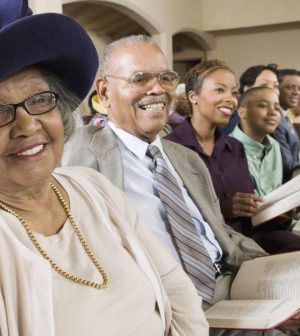- Recognizing the Signs of Hypothyroidism
- 10 Strategies to Overcome Insomnia
- Could Artificial Sweeteners Be Aging the Brain Faster?
- Techniques for Soothing Your Nervous System
- Does the Water in Your House Smell Funny? Here’s Why
- Can a Daily Dose of Apple Cider Vinegar Actually Aid Weight Loss?
- 6 Health Beverages That Can Actually Spike Your Blood Sugar
- Treatment Options for Social Anxiety Disorder
- Understanding the Connection Between Anxiety and Depression
- How Daily Prunes Can Influence Cholesterol and Inflammation
Black Churches Could Be Key to Boosting Vaccination Rates

Black churches could prove crucial in improving COVID-19 vaccination rates among Black Americans, a new study suggests.
The COVID-19 death rate among Black Americans is three times higher than among white Americans, and health officials had hoped that vaccines would narrow that gap.
However, Black communities are disproportionately affected by barriers to vaccination, such as limited online access and a lack of transportation.
As a result, less than 15% of Black Americans have received the first dose of a COVID vaccine.
“Black churches have long been more than places of worship to their communities,” said study leader Jacinda Abdul-Mutakabbir, an assistant professor of pharmacy at Loma Linda University in California. “They serve as strongholds for disseminating trusted information and have been integral in our initiative to help achieve racial equity in the COVID-19 vaccine rollout.”
To address low vaccination rates among Blacks in California’s San Bernardino County, Loma Linda researchers began collaborating with Black churches and health agencies to promote immunization and improve access.
While Black people make up nearly 8% of the county’s residents, they represent only 3.2% of the more than 14,000 county residents vaccinated at Loma Linda University clinics during a one-month period.
So researchers decided to hold mobile clinics to increase vaccination rates. First, they contacted 20 Black churches to share COVID-19 information and build church leaders’ support for the vaccines.
They then had a Black pharmacist conduct COVID-19 education webinars. These were advertised and coordinated by pastors, who also handled appointment lists for vaccination clinics to ensure that internet access was not a barrier.
During a mobile vaccination clinic held at a Black church on Feb. 6, 420 people were vaccinated, including 351 (84%) Black people.
Also, Black attendance at Loma Linda’s mass vaccination sites rose in the week after the mobile clinic. Of 9,373 first-dose vaccines, 399 (4.3%) were received by Black people.
This increase may have been due to mass clinic information provided during the mobile vaccination effort, according to authors of the study being presented at the online meeting of the European Congress of Clinical Microbiology & Infectious Diseases, which concludes Monday. Research presented at meetings is typically considered preliminary until published in a peer-reviewed journal.
“In religious communities of color, where access to vaccination centers is limited and vaccine hesitancy is often rooted in mistrust of heath care systems, seeing faith leaders put their trust in COVID-19 vaccines is a key motivator for them to do the same,” Abdul-Mutakabbir said.
“We have vaccinated 1,542 Black individuals in San Bernardino County to date and have expanded our efforts to provide comprehensive information to Latino/LatinX communities, who have also been underrepresented in traditional vaccination efforts,” she added.
Results of those efforts should be available in coming months, Abdul-Mutakabbir added.
More information
The U.S. Centers for Disease Control and Prevention has more on COVID-19 vaccines.
SOURCE: European Congress of Clinical Microbiology & Infectious Diseases, news release, July 8, 2021
Source: HealthDay
Copyright © 2026 HealthDay. All rights reserved.










